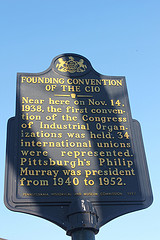
Hillman Judge Harold Meyerson on the future of the AFL-CIO and Sidney Hillman’s legacy of organizing workers whom others considered unorganizable:
During the floor debate yesterday on a resolution expanding the AFL-CIO’s commitment to take the workers excluded from labor law’s protections into its ranks—domestic workers, taxi drivers, day laborers, and the like—one delegate to the union’s quadrennial convention likened the proceedings to the 1935 AFL convention, when a sizable group of unionists wanted the Federation to expand its ranks to include factory workers. The more conservative Federation leaders, including its president, William Green, believed that unions should represent only workers in skilled trades—carpenters, masons, plumbers, and so on. But John L. Lewis of the Mine Workers and Sidney Hillman of the Clothing Workers believed that there were millions of factory workers who would flock to unions if given the chance. [Prospect]
It wasn’t all smooth sailing for Sidney:
Lewis and Hillman’s motion to organize factory workers was put to a vote and lost. They were not happy. Indeed, Lewis decked Big Bill Hutchinson, the president of the Carpenters, and stormed out—to form the CIO, a labor organization pledged to organize factory workers and that organized millions of them over the next couple of years.
The AFL-CIO is revisiting many of the same issues the AFL tackled in 1935, when immigrants, workers of color, and women sought to join a predominantly white, male union movement. The good news is that in 2013, the AFL-CIO is welcoming these workers with open arms. The survival of the labor movement demands it.
Sidney would be proud.
[Photo credit: Joseph_a, Creative Commons.]








